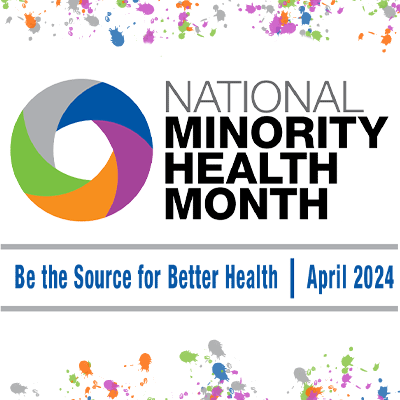- March 28, 2024
National Minority Health Month

Every April, the National Institute of Mental Health (NIMH) recognizes National Minority Health Month, a time dedicated to raising awareness about the persistent disparities in mental health care experienced by racial, ethnic, and other minority groups. Despite strides in understanding and treating mental health issues, these disparities persist, affecting the well-being of individuals and communities across the nation.
One of the most pressing challenges faced by minority populations is accessing adequate mental health care. Barriers such as stigma, cultural differences, language barriers, and socioeconomic factors often prevent individuals from seeking or receiving the help they need. As a result, many suffer in silence, exacerbating their mental health conditions and widening existing disparities.
This year, as we observe National Minority Health Month, it is imperative to take action. Education is key in breaking down the barriers to mental health care access. By raising awareness about the importance of improving access to mental health services for minority populations, we can begin to dismantle the systemic obstacles that hinder equitable care.
Educating the public involves spreading knowledge about the prevalence of mental health issues among minority groups, as well as the unique challenges they face in accessing treatment. It also entails promoting culturally competent care that respects the diverse backgrounds and experiences of individuals seeking help.
Community outreach programs, educational workshops, and online campaigns are effective tools for disseminating information and fostering dialogue about mental health disparities. By engaging with local communities and partnering with cultural organizations, healthcare providers, and advocacy groups, we can amplify our efforts to address these disparities.
Moreover, advocating for policy changes at local, state, and national levels is crucial for creating systemic solutions. This includes supporting legislation that improves access to mental health services, increases funding for culturally competent care initiatives, and addresses social determinants of health that contribute to disparities.
As individuals, we can also play a role in supporting minority mental health by becoming allies, challenging stigma, and promoting inclusivity in our communities. By actively listening to the experiences of minority individuals, offering support, and advocating for their rights, we can help create a more equitable and compassionate society.
National Minority Health Month serves as a reminder of the ongoing need to address mental health disparities affecting minority populations. By taking action to educate ourselves and others, advocating for policy changes, and fostering inclusive communities, we can work towards a future where everyone has equal access to the mental health care they deserve. Together, let us strive to build a more equitable and supportive world for all.

